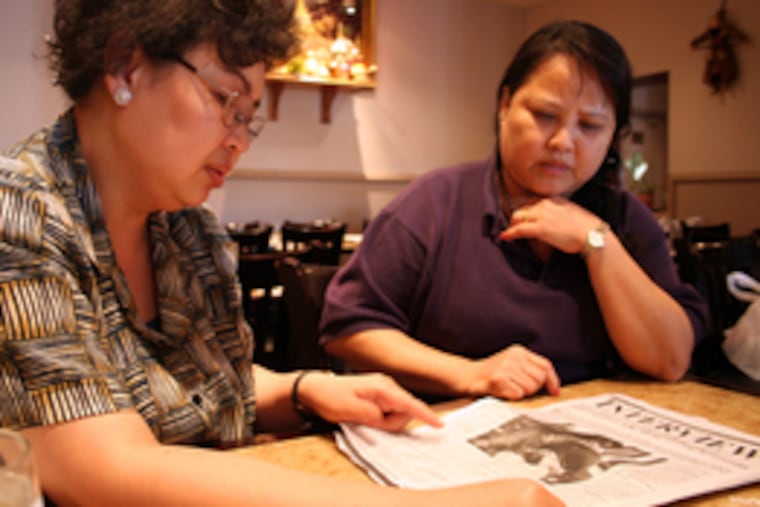Myanmar 'looks like the ancient times: No civilization'
MORE THAN FIVE weeks after a catastrophic cyclone hit the southeast Asian country of Myanmar - also known as Burma - the sorrow is heavy among Burmese natives living a world away in Philadelphia.

MORE THAN FIVE weeks after a catastrophic cyclone hit the southeast Asian country of Myanmar - also known as Burma - the sorrow is heavy among Burmese natives living a world away in Philadelphia.
"Because of the storm, people don't have a house, and it's the raining season," said a distraught Chiu Sin Mae, 49, seated in a booth at the Rangoon Burmese Restaurant, on 9th Street near Arch, in Chinatown.
"The government moved people from the delta, but the military told them they were not welcome in city. But they have nowhere to go back to, because their houses are still under water. Where is home? On the street with an umbrella?
"The government is taking its time, killing its own people. It's a genocide."
Tens of thousands of people may never be identified because their bodies have decomposed so badly and many ended up far from home, the International Committee of the Red Cross said yesterday.
The task of burying an estimated 78,000 bodies has been overshadowed by efforts to assist Cyclone Nargis' 2.4 million survivors, many of whom are still without adequate food, water and shelter, the Red Cross said. As a result, bloated bodies still litter the hard-hit Irrawaddy delta, while other bodies have been dumped in canals or unmarked mass graves.
In interviews yesterday and last week at the Philadelphia restaurant, several Burmese natives accused Myanmar's ruling junta not only of mishandling the disaster, but also of turning its police force against its own people.
"Malaria, cholera and HIV are breaking out in Burma," said Mya S. Solomon, 27, who migrated to Philadelphia at age 9. "This is a human-rights issue, and all people should just go in and help," bypassing the military to deliver aid directly to the people.
Solomon, who still has family in Myanmar, said a cousin there had told her of widespread looting, and of people who tried to help being imprisoned or killed.
"The soldiers only clean up their neighborhoods and pathways," an angry Solomon said, calling junta leader Senior Gen. Than Shwe "the next Stalin."
Mae agreed: "Burma looks like the ancient times: no civilization, naked children praying in the street for help."
Mae said she had relayed messages to relatives in Myanmar that TV networks were showing relief efforts under way, then felt brokenhearted when she realized the junta was not letting the aid in. "The country people are praying for help, waiting for help," she said. "I am so upset that the help has left."
According to Mae and Solomon, Shwe is using brutal tactics against his own people. They cited harrowing Internet photos and stories of dead youths lined up on the street or floating in infested waters, and others burned or killed bathing in ocean waters contaminated by a chemical leak.
"Doctors here want to help, applied for a visa and were denied by the government," said Christine Gyaw, 50, a co-owner of the restaurant. "The government will arrest the doctors [that do make it to Myanmar], saying they are smuggling in narcotics."
Gyaw said yesterday that she had received an e-mail from a cousin three days ago informing her that the body of another cousin, Muang Bey, 66, had been "found in a tree."
"He was a Christian pastor, living in the delta base," said Gyaw, who migrated to Philadelphia in 1990. "The whole village is gone."
The restaurant is doing what it can to help. The owners have placed a donation box at the door, and the funds are going to the America Burma Buddhist Association (www.mahasiusa.org). But although most customers are caring and giving, some hesitate to give because they don't know if the junta will intercept the funds, said Solomon.
"Please, we are begging for help," said Mae, on the brink of tears. "[Powerful countries] shouldn't wait for permission. My heart is hurting, and the people are helpless."
With only six United Nations helicopters and seven from the Myanmar government, relief supplies for survivors are mostly being transported along dirt roads and then by boat. International aid agencies say boats able to navigate the delta's canals are scarce and efforts to import vehicles have been hampered by government red tape.
The government has dismissed complaints that survivors are not being reached with aid and ignored reports that they have been forced from camps and dumped near their devastated villages. It said survivors have a choice to remain in the camps or return home with government help.
"It is a storm of rumors designed to deal a devastating blow to our country," according to a commentary Saturday in the Yangon-based newspaper New Light of Myanmar.
"The rumors are invented and circulated by certain Western countries and internal and external ax-handlers," it said. "In other words, it is just a scheme conspired by a crafty tiger that is desperate to eat the flesh and the fox that is waiting for leftovers."
The Associated Press contributed to this report. *